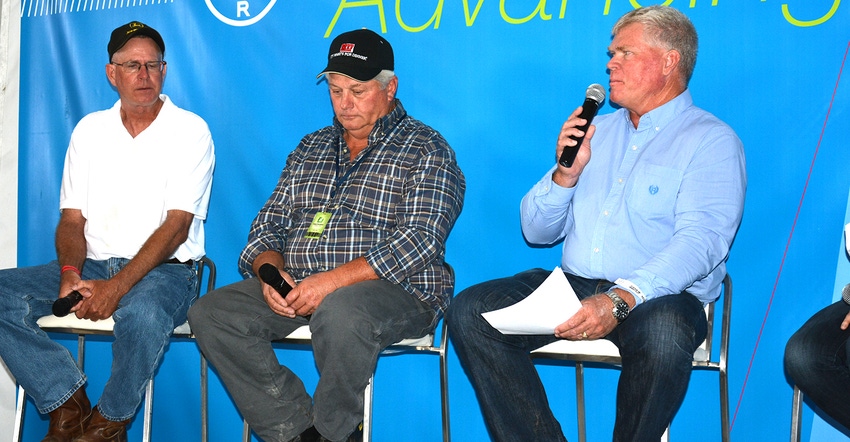September 10, 2018

By Paula Mohr
Communication is key when it comes to preparing the transition for the next generation on the family farm.
That was the resounding message from two Wisconsin farmers and an ag financial professional who shared their stories and insight on farm transition planning during a panel discussion at the Farm Progress Show Aug. 29 in Boone, Iowa.
On the panel were:
• Jeff Waller, Janesville, Wis. Waller farms with his wife, Tamie, and raises corn and food-grade soybeans. They have a son, DJ, age 20, who is in the early stages of transitioning to the family farm. DJ has been renting his own farm since age 17 and is harvesting his fourth crop this fall.
• Bob Arndt, Janesville, Wis. Arndt grows corn, soybeans, vegetables, peppermint and alfalfa, and raises beef. He farms with his brothers, David and Alan, and his sons, Abraham and Austin. His sons are full-time employees and fourth-generation owners in the operation.
• Greg Nickrent. Nickrent is a senior relationship manager with BMO Harris, Rockford, Ill., who works in ag finance and grew up on a corn and soybean farm.
The three wasted no time zeroing in on the importance of early and consistent communication when considering farm transition planning.
“The lack of communication with the generation you want to pass the farm onto is common,” Nickrent said. To get the ball rolling, he suggested finding a good farm adviser or other professional who could help you start the conversation and keep it going. To get ideas or referrals of professionals to assist you, Nickrent suggested asking neighbors who they work with, or attending conferences on estate planning.
�“Your banker is also a key part of this team,” he added. Other professionals to consider would be your accountant and/or lawyer.
Waller said he was fortunate that his dad started talking with him about farm transition at an early age and expressed his desire to keep the base farm intact. His dad died when Waller was 25, and at the time, his two off-farm sisters were compensated in other ways.
“Being involved at a younger age helped me,” he said. However, he said if he could do it all over again, he would have had experts in the field more involved.
“A mistake for me is that I had to go through probate,” he said. “Maybe I should have had a trust.”
Arndt shared that it took some time to get his dad to talk about estate planning.
“My dad was a tough nut. … He kept things to himself,” he said. “We did have some succession planning in place by the time he died.”
Arndt used that life lesson to help structure his family farm’s estate planning today. The farm operates with a board of directors. His sons had to work on the farm for two years after college and then be voted on by the board — which consists of family — to become fully vested as owners. Both have done that.
“They built their way into this business,” Arndt said. “I’m blessed that my sons are doing this.”
Keep talking
All three panelists could not emphasize enough the importance of talking about farm transition now — and not waiting.
“It’s very important to make sure everyone is on the same page,” Nickrent said. Current owners need to be clear about their estate planning goals and outcomes; the next generation needs to know what, when and how business enterprises will be transferred to them.
Prepare, too, for the sensitive topic of nonfarming heirs in transition planning to take additional thought and discussion. This is where professional advice could prove to be invaluable: helping sort emotions of entitlement versus what is fair to on-farm working heirs.
Arndt’s family farm business is working through a slightly different scenario with this. His two brothers each have four children, and they have not been involved on the farm. As their family farm diversified over the years, its enterprises expanded beyond traditional farming and helped the financial bottom line.
“The farm business is pretty good now,” Arndt said. “Suddenly the other kids say they want to be involved. … We built this from the ground up over 40 years, and working it hasn’t been easy.” He admitted that finding a fair resolution to the issue will be a challenge.
Regardless, Waller said, you must talk about the transition process if it is important for you to see your farm business continue.
“It is a touchy subject,” he said. “But don’t avoid it. It will only be harder [to transition the farm to the next generation] if you don’t have a plan.”
You May Also Like




